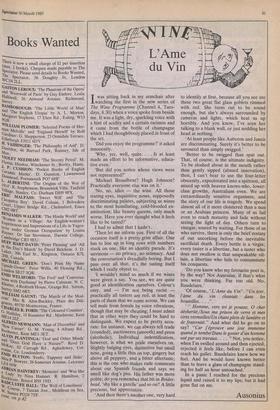T was sitting back in my armchair after 'watching the
first in the new series of The Wine Programme (Channel 4, Tues- days, 8.30) when a voice spoke from beside me. It was a light, dry, sparkling voice with a hint of acidity and a certain raciness and it came from the bottle of champagne which I had thoughtlessly placed in front of the set.
Did you enjoy the programme?' it asked innocently.
'Why, yes, well, quite. . . . It at least made an effort to be informative, educa- tive even.'
'But did you notice whose views were not represented?'
'Michael Broadbent? Hugh Johnson? Practically everyone else was on it.'
`No, no, idiot — the wine. All those staring eyes, inquisitive noses, supposedly discriminating palates, subjecting us wines to the most humiliating, cold-blooded ex- amination; like beauty queens, only much worse. Have you ever thought what it feels like to be tasted?'
I had to admit that I hadn't.
'Then let me inform you. First of all the occasion itself is a pretty grim affair. One has to line up in long rows with numbers stuck on one, like an identity parade. It's unvinous — no privacy, no intimacy. And the conversation's dreadfully boring. But I pass over all that; it's the tasting itself which I really object to.
'I wouldn't mind so much if we wines were given a say. You see, we are quite good at identification ourselves. Colour's easy, and — I'm not being racist — practically all tasters are red, at least the parts of them that we come across. We can tell male from female by voice vibrations, though that may be cheating; I must admit that in other ways they could be hard to distinguish. We expect to be pretty accu- rate: for instance, we can always tell trade (rounded), auctioneers (smooth) and press (alcoholic). Individual indentification, however, is what we pride ourselves on.
Slightly bulging eyes, distinctive but small nose, going a little thin on top, gingery but above all peppery, and a bitter aftertaste; this is the one who makes rude comments about our Spanish friends and says we
smell like dog's piss. His father was more polite; do you remember that bit in Brides- head, 'shy like a gazelle' and so on? A little precious, but appreciative.
'And then there's another one, very hard to identify at first, because all you see are these two great flat glass goblets rimmed with red. She turns out to be sound enough, but she's always surrounded by cameras and lights, which heat us up horribly. And you know, I've seen her talking to a blank wall, or just nodding her head at nothing.'
'At least people like Auberon and Jancis are discriminating. Surely it's better to be savoured than simply swigged.'
'Better to be swigged than spat out. That, of course, is the ultimate indignity. To be sloshed about in the mouth rather than gently sipped (absurd innovation), then, I can't bear to use the four-letter obscenity, expectorated into a spittoon, all mixed up with heaven knows-who, lower- class growths, Australians even. We are extraordinarily sensitive organisms, and the story of our life is tragedy. We spend almost all of it more cloistered than a nun or an Arabian princess. Many of us fail even to reach maturity and fade without seeing the light of day. Others turn to vinegar, soured by waiting. For those of us who survive, there is only the brief ecstasy of our uncorking before the inevitable sacrificial death. Every bottle is a virgin; every taster is a libertine, but a taster who does not swallow is that unspeakable vil- lain, a libertine who fails to consummate his conquests.
'Do you know who my favourite poet is, by the way? Not Ausonius, if that's what you were thinking. Far too old. No, Baudelaire.'
'Of course, "L'Ame du Vin". "Un soir, l'ame du yin chantait dans les bouteilles. . . .".
" Homme, vers toi je pousse, 0 cher desherite,ISous ma prison de verre et mes cires vermeilleslUn chant plein de lumiere et de fraternite." And what did he go on to say? "Car j'eprouve une joie immense quand je tombel Dans le gosier d'un homme use par ses travaux. . . . " Not, you notice, when I'm swilled around and then ejected, rejected it feels like, before I can even reach his gullet. Baudelaire knew how we feel. And he would have known better than to leave a glass of champagne stand- ing for half an hour untouched.'
In a panic I reached for the precious liquid and raised it to my lips; but it had gone flat on me.
Ausonius














































 Previous page
Previous page